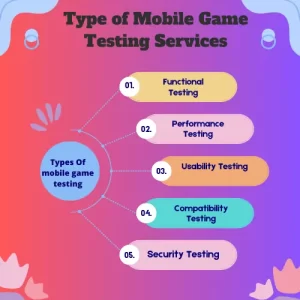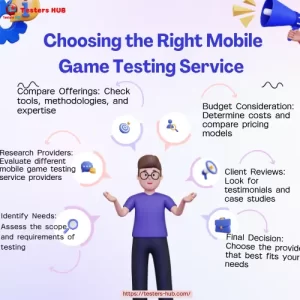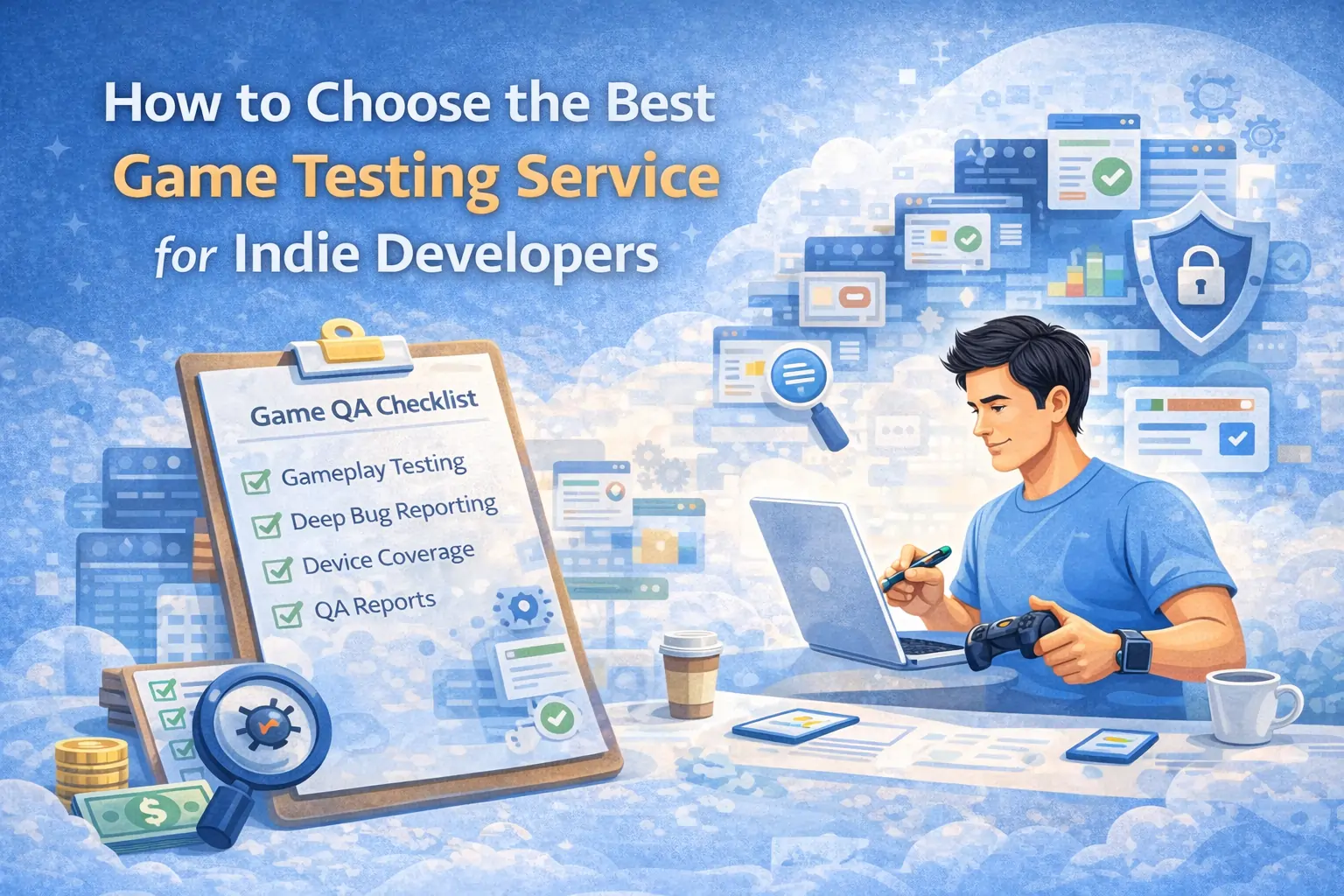How to Set Up a Mobile Game Testing Services Strategy
In the fast-paced world of mobile gaming, mobile game testing services are essential for ensuring that new titles meet the high expectations of players. As developers launch countless games daily, delivering a high-quality gaming experience is paramount. A successful mobile game must captivate players with engaging gameplay and stunning graphics while performing flawlessly across various devices and platforms. This blog post will guide you through setting up a robust strategy for mobile game testing services that will ensure your game is ready for the competitive market.
Understanding the Importance of Mobile Game Testing Services
Before diving into the strategy, it’s crucial to understand why mobile game testing services are essential. With millions of mobile games available, players have high expectations regarding performance, usability, and overall quality. A game that crashes, lags, or has bugs will lead to negative reviews, low ratings, and ultimately, a decline in downloads and revenue.
The primary goal of mobile game testing services is to identify and resolve issues before launch. This includes everything from gameplay mechanics and graphics to compatibility and security concerns. By investing in comprehensive testing services, developers can ensure that their games meet industry standards and provide an exceptional user experience.
Key Benefits of Mobile Game Testing Services
- Enhanced Player Satisfaction: Mobile game testing services are essential for uncovering and addressing bugs, performance issues, and usability challenges. By resolving these problems, developers can create a more enjoyable gaming experience. When players have a smooth experience, they are more likely to leave favorable reviews and recommend the game to others.
- Quicker Launch Readiness: A well-organized testing strategy allows developers to identify potential issues early in the development cycle. By tackling these challenges before the official release, teams can accelerate the overall timeline, helping to bring the game to market faster and gain a competitive advantage.
- Cost Savings: Identifying and fixing issues during the development phase is considerably more cost-effective than addressing them after the game has launched. By investing in mobile game testing services early on, developers can avoid the high costs associated with post-launch bug fixes, ultimately saving money.
- Increased Player Retention: Games that undergo rigorous testing are more likely to keep players engaged over time. Users who encounter bugs or experience poor performance may abandon the game. Effective testing practices can lead to higher retention rates, ensuring that players stick around for future updates and expansions.
- Consistent Performance Across Devices: With the diverse array of devices available on the market, thorough testing is crucial to ensure that your game performs optimally across various platforms and screen resolutions. This versatility is key to attracting a wider audience and enhancing user satisfaction.
Step 1: Set Clear Testing Objectives
The first step in developing a robust mobile game testing services strategy is to establish specific testing objectives. This means identifying the critical features and elements of your game that require assessment. Consider these guiding questions:
- What are the essential gameplay mechanics? Recognizing the key functions of your game will help direct your testing efforts towards the most impactful areas.
- On which platforms will your game be launched (iOS, Android, etc.)? Each platform presents unique standards and guidelines. Understanding these will shape your testing methodology to ensure compatibility across all devices.
- Who are your target players? Identifying the characteristics and preferences of your intended audience allows you to design the user experience in a way that resonates with them.
By clearly articulating your testing objectives, you can customize your testing strategy to align with your specific requirements, ensuring that your efforts contribute effectively to your overall development process.
Step 2: Types of Mobile Game Testing Services
To achieve a comprehensive assessment of your mobile game, it’s important to choose the right types of testing. Here are some essential mobile game testing services that should be incorporated into your strategy:
Functional Testing
Functional testing focuses on verifying that all game features work as intended. This involves evaluating gameplay mechanics, user interfaces, and various in-game elements. Identifying and resolving any issues in these areas is critical for preventing player frustration and ensuring positive feedback.
Performance Testing
Performance testing evaluates how well the game operates under different conditions, such as low battery life, poor internet connectivity, and high user demand. This type of testing is crucial for ensuring that your game maintains a smooth performance across various devices, especially during times of peak activity.
Usability Testing
Usability testing focuses on assessing how intuitive and pleasurable the game is for users. This involves collecting insights from players regarding aspects like ease of navigation, responsiveness of controls, and overall enjoyment. The feedback derived from this testing is essential for fine-tuning the game mechanics and boosting player engagement.
Compatibility Testing
Compatibility testing checks whether your game performs well across various devices and screen resolutions. Considering the vast number of mobile devices currently on the market, it’s vital to ensure that your game provides a consistent experience regardless of the platform. This testing phase is crucial for maximizing your reach and enhancing user satisfaction.
Security Testing
Security testing is aimed at detecting potential weaknesses that could compromise user privacy and data integrity. In an era where data security is paramount, implementing robust protective measures within your game is critical. This commitment not only safeguards user information but also helps build long-term trust with your player base.
Step 3: Develop a Testing Plan
An effective testing plan is vital for the successful organization and execution of your mobile game testing services. This plan should cover the following critical components:
Testing Phases
Define the distinct stages of testing, including alpha, beta, and post-launch assessments. Alpha testing is typically conducted by the internal development team, focusing on identifying and resolving issues before the game reaches external testers. Beta testing involves a chosen group of external players who interact with the game and offer feedback, which is invaluable for making final adjustments.
Timelines
Create achievable timelines for each testing stage to ensure the project stays on course. A clear timeline is important to prevent testing from causing delays in the overall development schedule.
Resource Allocation
Determine the personnel responsible for various aspects of the testing process. This could involve utilizing your internal team, hiring external testing services, or employing a combination of both. Clearly assigning roles and responsibilities will help facilitate a smoother testing process and enhance accountability.
Step 4: Implement Automation
Integrating automation into your mobile game testing services can greatly enhance both efficiency and effectiveness. Automated testing offers several benefits:
Repetitive Testing
With automated testing, you can swiftly retest features after each development cycle, which saves valuable time and helps ensure that new updates do not introduce unforeseen bugs.
Performance Testing
Automation allows you to simulate a large number of users simultaneously, which is essential for assessing load capacity. This capability helps pinpoint performance issues before the game goes live.
Regression Testing
It’s crucial to verify that new updates do not create new bugs, as maintaining game quality is a top priority. Automated regression testing can efficiently confirm that existing functionalities still work as expected after modifications are made.
By adopting automation in your mobile game testing services, you can minimize the time dedicated to testing while improving both coverage and accuracy.
Step 5: Collect and Analyze Feedback
Feedback is critical in refining your game. Engage beta testers and use mobile game testing services to gather insights on performance, usability, and potential issues. Analyze this feedback to:
Identify Trends
Look for patterns in user feedback to pinpoint common issues. For example, if multiple users report that a specific level is too difficult, it may require rebalancing.
Prioritize Fixes
Address the most critical issues first, based on user impact. Not all bugs are equal; some may severely impact gameplay, while others may be minor annoyances.
Iterate on Design
Make necessary adjustments to improve overall gameplay and user satisfaction. Continuous improvement based on user feedback is vital for maintaining a positive gaming experience.
Step 6: Continuous Testing and Improvement
Mobile game testing doesn’t conclude with the game’s launch. To stay competitive, it’s essential to implement a strategy for ongoing testing and enhancement. This can include:
Regular Updates
Establish a schedule for consistent testing of new features and updates. Regular updates help keep your game exciting and engaging, but they also necessitate comprehensive testing to uphold quality standards.
Monitoring User Experience
Utilize analytics tools to monitor player interactions and behaviors within the game. Gaining insights into how players engage with your game can help you identify potential areas for enhancement and guide future updates.
Incorporating User Feedback
Create a feedback loop with your player community to continuously gather insights. Actively engaging with your players demonstrates that you value their input and are dedicated to enhancing their gaming experience.
Step 7: Choosing the Right Mobile Game Testing Services
Selecting the appropriate mobile game testing services is critical for the overall success of your game. With many testing providers available, it’s essential to make a careful and informed choice. Here are some important factors to keep in mind when evaluating mobile game testing services:
1. Assess Your Requirements
Before embarking on the selection journey, it’s crucial to analyze the scope and specific needs of your testing. Ask yourself the following questions:
- Which platforms will your game be released on? (iOS, Android, etc.)
- What types of testing do you need? (Functional, performance, usability, security, etc.)
- Which specific features and mechanics require special attention during testing?
Understanding your requirements will allow you to narrow down your options and identify a provider that specializes in the areas you need most.
2. Investigate Potential Providers
After clarifying your testing needs, begin researching potential service providers. Aim to find companies with a strong reputation in the mobile game testing arena. Effective research strategies include:
- Online Research: Use search engines and relevant industry forums to locate reviews and ratings of different testing services.
- Social Media and Networking: Engage with game development and testing communities on social media to ask for recommendations.
- Industry Conferences and Events: Participate in webinars, expos, and conferences related to gaming and software testing to meet potential providers.
3. Review Client Feedback
Look for client testimonials and case studies to assess the quality of a provider’s services. Focus on the following elements:
- Case Studies: Search for examples that illustrate how the testing service has helped other game developers improve their projects.
- Customer Reviews: Read feedback from clients regarding their experiences with the provider, particularly concerning communication, efficiency, and results.
Positive reviews from previous clients can provide insightful information about a provider’s dependability and effectiveness.
4. Review Service Offerings
When evaluating various mobile game testing services, it is important to compare their offerings to ensure they align with your project’s requirements. Consider the following factors:
- Testing Tools and Technologies: Research the specific tools and technologies that each provider employs. Advanced testing tools can greatly enhance the efficiency and precision of the testing process.
- Testing Approaches: Gain insight into their testing methodologies. Do they primarily use manual testing, automated testing, or a combination of both approaches?
- Relevant Experience: Seek providers with a proven track record in testing games that are similar to yours in genre, platform, or intended audience.
Choosing a provider equipped with the appropriate tools and methodologies can significantly enhance the comprehensiveness and reliability of your testing efforts.
5. Analyze Budget Constraints
It is essential to define your budget for mobile game testing services early in the process. Here are some key considerations:
- Pricing Models: Understand the pricing structures that different providers offer. Are they charging on an hourly basis, per project, or through retainer agreements?
- Evaluating Value: Avoid simply going for the lowest-priced option; instead, assess what you receive for your budget. In some cases, investing a little more can result in better service and higher quality.
By comparing costs while also considering the level of service, you can find a provider that meets your financial needs and fulfils your testing requirements.
6. Finalize Your Decision
Once you have thoroughly reviewed your options, it’s time to make your final selection. Keep the following points in mind:
- Alignment with Your Needs: Choose a provider that fits your specific testing needs, budget, and timeline.
- Communication and Responsiveness: Evaluate how well the provider communicates throughout the selection process. A partner who is responsive and supportive is essential for successful collaboration.
- Flexibility and Future Growth: Ensure that the provider can accommodate future changes and scaling as your game evolves.
By following these guidelines and carefully weighing your options, you can select the right mobile game testing services that will significantly contribute to the success of your game.
Conclusion
Establishing a thorough strategy for mobile game testing services is crucial for delivering an exceptional gaming experience. By setting clear objectives, choosing the right types of testing, creating a comprehensive testing plan, utilizing automation, and continuously improving based on player feedback, you can position your game for success in a competitive landscape.
Investing in mobile game testing services will yield significant long-term benefits, such as increased user satisfaction, higher retention rates, and overall success for your game. Keep in mind that a game’s success extends beyond its initial launch; it relies heavily on ongoing enhancements driven by meticulous testing and player insights.
Are you prepared to elevate your mobile game? Begin implementing an effective mobile game testing services strategy today and watch as the quality of your game and user satisfaction levels rise. Start your testing journey now to ensure your game stands out in the dynamic mobile gaming industry!












